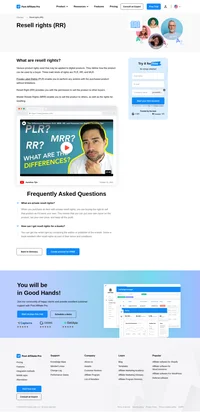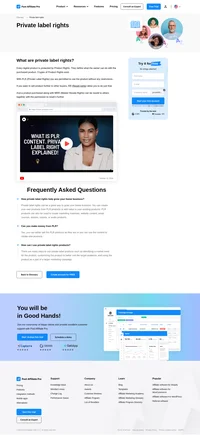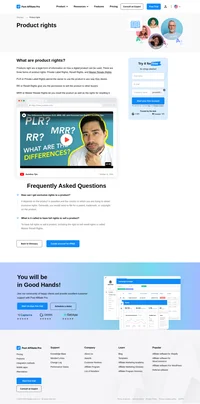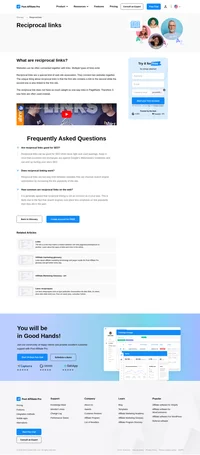What is MRR?
Master Resell Rights (MRR) and Monthly Recurring Revenue (MRR), although sharing an acronym, pertain to different facets of online business and affiliate marketing. Understanding these terms is essential for anyone entering the digital marketing arena.
Master Resell Rights (MRR)
Master Resell Rights refer to a business model where individuals purchase the rights to sell a digital product and retain all profits from the sales. Additionally, they can sell these rights to others, who can also sell the product. This model is prevalent in digital products like software, e-books, and courses.
Master Resell Rights offer a unique opportunity for digital entrepreneurs to leverage existing products for profit. By acquiring these rights, an individual can essentially become the product owner, with the ability to sell the product an unlimited number of times. The appeal of MRR lies in its potential for high-profit margins without the need for product development. Products often come with pre-made sales materials, which significantly reduce the effort required for marketing.
Monthly Recurring Revenue (MRR)
Monthly Recurring Revenue is a crucial metric for subscription-based businesses, especially in the Software as a Service (SaaS) industry. It represents the predictable income a company expects monthly from its subscribers. Understanding MRR helps businesses gauge their financial health and growth trajectory.
The importance of Monthly Recurring Revenue cannot be understated in subscription-based business models. It provides a stable financial forecast, allowing businesses to plan for future growth and investment. MRR is a key performance indicator (KPI) that reflects the health of a business’s subscription model, helping to analyze trends in customer acquisition, retention, and churn rates.

Master Resell Rights (MRR) in Affiliate Marketing
What Are Master Resell Rights?
Master Resell Rights allow you to resell a product and keep 100% of the sales revenue. This model is attractive due to its potential for high-profit margins without the need for product creation. MRR products often come with sales materials, reducing marketing efforts significantly.
Key Features:
- Ownership: Buyers have full ownership and can modify or bundle products.
- Profit Margin: Retain all profits from sales, unlike affiliate marketing, where you earn a commission.
- Control: Full control over pricing and marketing strategies.
- Customer Support: Responsibility for customer support lies with the reseller.
Master Resell Rights empower individuals to act as independent vendors, offering them the flexibility to modify and enhance the product as they see fit. This level of control is unheard of in traditional affiliate marketing, where affiliates are limited to promoting and earning commissions from sales.
Benefits of MRR
- High Profitability: Retention of all sales profits.
- Flexibility: Ability to modify and repackage products.
- Brand Authority: Positioning as a product owner can establish expertise.
MRR enables individuals to build their brand authority by establishing themselves as product owners. This not only enhances credibility in the marketplace but also opens up opportunities for further collaborations and partnerships.
Challenges with MRR
- Initial Investment: Requires upfront purchase of rights.
- Quality Assurance: Ensuring product quality is crucial for maintaining reputation.
- Market Saturation: Risk of competing with other resellers offering the same product.
The initial cost of acquiring Master Resell Rights can be a barrier for some entrepreneurs. Additionally, the responsibility of maintaining product quality and providing customer support can be challenging, particularly for those new to the market.
Monthly Recurring Revenue (MRR) in Affiliate Marketing
What is Monthly Recurring Revenue?
Monthly Recurring Revenue is a financial metric used to predict monthly income from ongoing subscriptions. It’s vital for businesses focusing on long-term growth and sustainability, particularly in SaaS and subscription models.
Key Features:
- Predictability: Provides a stable revenue forecast.
- Growth Measurement: Tracks business growth and customer retention.
- Financial Health: Helps in financial planning and forecasting.
The predictability of MRR makes it a cornerstone for businesses aiming to achieve long-term stability. It allows for more accurate financial planning and budgeting, providing insights into future revenue streams and potential areas of expansion.
Importance of MRR
- Financial Stability: Ensures a steady cash flow.
- Business Valuation: Higher MRR can increase company valuation.
- Performance Indicator: Reflects customer satisfaction and business growth.
MRR is a vital indicator of a company’s health and sustainability. A high MRR not only suggests a robust subscription model but also enhances the company’s valuation, attracting potential investors and stakeholders.
Calculating MRR
MRR is calculated by multiplying the Average Revenue per User (ARPU) by the total number of users, providing a clear picture of monthly financial performance.
Strategies to Increase MRR
- Upselling and Cross-Selling: Offering additional products or services to existing customers.
- Customer Retention: Implementing loyalty programs and excellent customer service.
- Pricing Strategies: Adjusting pricing models to maximize revenue.
Increasing MRR requires strategic efforts focused on customer retention and value enhancement. Companies often leverage upselling and cross-selling strategies to boost revenue from existing customers.
MRR vs. Affiliate Marketing
Comparing MRR and Affiliate Marketing
Both models offer unique opportunities for income generation in the digital space. Here’s a comparison:
- MRR (Master Resell Rights): Offers complete control and 100% profit but requires product management and customer support. Ideal for those with resources to invest in quality products upfront.
- Affiliate Marketing: Requires no product creation or ownership. Affiliates earn a commission for promoting products, making it an attractive option for those new to online business.
While Master Resell Rights offer full control and potentially higher profits, affiliate marketing offers a low-risk entry point into digital entrepreneurship. Affiliates benefit from established product reputations and marketing support from product owners.
Integrating MRR with Affiliate Marketing
Combining both models can diversify income streams and maximize revenue potential. For instance, using affiliate marketing to promote MRR products can expand reach and boost sales.
Integrating MRR with affiliate marketing strategies can create a synergistic effect, where each model complements the other, amplifying overall income potential and market reach.
Legal Considerations
Understanding licensing agreements for MRR and adhering to FTC guidelines in affiliate marketing is essential to avoid legal pitfalls.
Legal compliance is crucial when dealing with both MRR and affiliate marketing. Ensuring that all licensing agreements and marketing practices adhere to legal standards is vital to maintain business integrity and avoid legal repercussions.

Whether you're a seasoned veteran or a newcomer, knowing the differences between Private Label Rights (PLR), Master Resell Rights (MRR), Resell Rights (RR), and Personal Use Rights can significantly impact how you utilize and monetize content. In this article, we'll delve into these rights, explaining their significance and how they tie into the broader scheme of affiliate marketing.
The Hierarchy of Content Rights
Private Label Rights (PLR)
PLR is at the top of the content rights hierarchy. It offers the most flexibility, allowing you to edit the content as you see fit. However, it's essential to understand that while you can modify the content extensively, you cannot claim copyright ownership. PLR content is typically non-exclusive, meaning many others may have access to the same material. This flexibility makes PLR an excellent tool for affiliate marketers who want to add personalized touches to their content, aligning it with their brand voice and style.
Master Resell Rights (MRR)
MRR allows you to resell the rights to resell the product. This means you can pass on the rights for others to resell the product as well. However, unlike PLR, you cannot edit the original content. MRR is a step down in terms of customization but offers an opportunity to create multiple revenue streams by expanding the distribution network.
Resell Rights (RR)
RR provides the ability to sell the product with read-only rights. Your customers can view the content but cannot alter or resell it. This restriction ensures the product remains intact and is ideal for those who wish to maintain control over the content's distribution and usage.
Personal Use Rights
At the base of the hierarchy, Personal Use Rights restrict the content to personal consumption only. There is no option to resell or distribute the content further. This is the most limited form of rights but serves a purpose for those who need content solely for educational or personal enrichment.
Why These Distinctions Matter in Affiliate Marketing
For affiliate marketers, understanding these rights is essential for crafting effective marketing strategies. Here are a few ways these rights can be leveraged:
- Membership Sites: Use PLR content to populate your membership site, providing value to subscribers with minimal effort.
- Bonus Content: Offer MRR or RR products as bonuses for customers who purchase through your affiliate link, incentivizing conversions.
- Brand Customization: Edit PLR content to reflect your brand's unique voice, ensuring consistency across your marketing materials.
FAQs
What is the main advantage of using PLR content in affiliate marketing?
PLR content provides the flexibility to edit and customize the material, allowing affiliate marketers to tailor it to their specific audience and brand voice, enhancing engagement and conversion rates.
Can I sell PLR content as it is?
While you can resell PLR content, it's often more beneficial to edit and personalize it to differentiate your offering from others who may have the same PLR content.
How do MRR and RR differ in terms of distribution rights?
MRR allows you to sell the rights for others to resell the product, whereas RR restricts your customers to read-only access, preventing further reselling or editing.
Conclusion
Understanding the differences between PLR, MRR, RR, and Personal Use Rights is crucial for maximizing your affiliate marketing efforts. By leveraging these rights effectively, you can enhance your content strategy, drive more traffic, and increase your revenue streams. Ready to take your affiliate marketing to the next level? Explore our affiliate software solutions at PostAffiliatePro to optimize your campaigns and boost your earnings.
Frequently Asked Questions
What are master resale rights?
Master resale rights are the rights to resell a product that you have purchased without modification. These rights are typically granted by the product creator and allow you to sell the product to others for a profit.
Can you sell MRR?
Yes, you can sell master resell rights.
Explore the intricacies of chargebacks in affiliate marketing with Post Affiliate Pro. Learn how chargebacks impact merchants and affiliates, and discover strategies to minimize their occurrence. Understand the consumer protection aspect while mastering preventive measures to safeguard your earnings and enhance customer satisfaction.
Discover the essentials of Resell Rights (RR) with Post Affiliate Pro. Learn how RR permits you to sell digital products to others, and explore the distinctions between Private Label Rights (PLR), Master Resale Rights (MRR), and personal use rights. Enhance your affiliate marketing strategy with this comprehensive guide.
Discover the power of Private Label Rights (PLR) on Post Affiliate Pro. Learn how PLR can boost your online business by letting you create and sell content effortlessly. Understand different types of PLR, including resale and master resale rights, and how to handle them effectively to maximize your profits. Visit now to unlock new revenue streams!
Discover the intricacies of reciprocal links on Post Affiliate Pro. Understand how these two-way connections between websites impact SEO and learn about their prevalence in top-ranking pages. Explore strategies for effective link building while adhering to Google's guidelines. Visit now to enhance your link-building knowledge!










